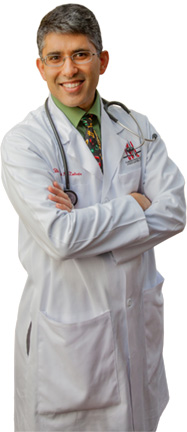 Deepak R. Talreja, MD
Deepak R. Talreja, MD
Bayview Cardiovascular Associates
Coming from a medical family – his father practiced medicine in Hampton Roads for 40 years and was named the Physician of the Year in 2016 by the Krueger Foundation – the question wasn’t whether Deepak Talreja would become a physician, but rather what specialty he would pursue. “From childhood on, I’d go on hospital rounds with my father,” he says. “My sister, Reena Talreja, is a local OB/GYN and my mother is a nurse. We don’t know how to do anything else.” He completed the family portrait by marrying a pediatrician, Dr. Hyeon Choi.
A 1993 graduate of the University of Virginia with a Bachelor’s in Biology and a minor in Philosophy, Dr. Talreja remained in Charlottesville for Medical School. After completing his internship and residency at Vanderbilt, he headed to the Mayo Clinic for a cardiovascular fellowship, which he completed in 2003, and a fellowship in interventional cardiology in 2004. He chose cardiology as he realized his passion lay with the heart. It may even have been a legacy: his father trained at the Cleveland Clinic in cardiology.
About his chosen field, Dr. Talreja says, “We know the heart well as an organ, with its fascinating plumbing, mechanical parts and electrical systems. We can fix a lot of what goes wrong with it, putting in stents, replacing valves or fixing electrical problems. We can make a difference and save people’s lives in real time. It’s so exciting.”
A particular area of excitement has been the development of fully percutaneously implantable valves. “For the last 30 years, if someone had a severe narrowing of an aortic valve, the only way to treat it was to open the chest, cut out the old valve, replace it with new one,” Dr. Talreja says. “But now, with the introduction of transcatheter aortic valve replacement – TAVR – we can implant a valve inside the body without ever opening the chest. Through a small arterial line in the leg, we pass the valve in, and often in less time than it took to do the full operation, we achieve similar results.” The procedure has been a boon for heart patients, including the elderly: TAVR is now routinely done on otherwise healthy 80 and 90 year-olds, who are home in a few days, scar-free.
At the opposite end of the spectrum, Dr. Talreja says, are developments in prevention, one in particular that shows promise. About 12 years ago, a genetic abnormality was identified in Caucasian and African American populations in the United States: a deficiency of PCSK9, an enzyme made by most, but lacking in some people. “When it was discovered that these people have LDL levels of 10 to 30 mg/dL, and they’re not developing vascular disease, everybody tried to find a way to replicate that,” Dr. Talreja says. “Unfortunately, there’s no drug that will do that, but monoclonal antibodies have been developed, which harness a person’s immune system, much the same way that the body creates an antibody to a virus.”
The potential is tremendous: “These humanized antibodies can be injected into the patient once or twice a month, and bring cholesterol down by over 50 percent. We had the opportunity to participate in studies with these agents and now they are available for clinical use.” In fact in March of 2017, he says, “there are new studies coming out that we hope will show they further reduce heart attack, stroke and death. The preliminary data is very favorable.”
These advances – and “our ability to prolong and extend both quality and length of life” – are remarkable, but Dr. Talreja sees a bit of a hard road ahead from the medical ethical standpoint. “It takes great intellectual maturity and wisdom as a people to understand when to use it, how to use it, how to distribute it fairly,” he emphasizes. “We’re clearly spending too much on medical care. Our costs are going to have to go down; prevention will be a huge part of this.”
For that to happen, it will mean people practicing healthfulness, and especially eating right, Dr. Talreja knows. He conducted a 2014 study that monitored the cholesterol changes in 400 people across the region, on various diets – Paleo, Vegan, Mediterranean and Dash. Researchers from the University of Virginia, Cleveland Clinic and the University of Alabama asked to follow these patients, all of whom were enthusiastic, most vowing never to return to their unhealthy habits. Thus far, only about a third have reverted. These findings were presented at the November 2015 meeting of the National Lipid Society and 2016 Cardiac Research Therapies meeting showing the effects of different diets on cholesterol levels.
“As a nation, we have to engage in prevention,” Dr. Talreja believes. “It’s the future of cardiology, as well as health care as a whole. Get people to eat healthy and quit smoking. Encourage them to exercise. That’s what will save us.”
Until that day comes, Dr. Talreja enjoys practicing in his hometown. He was torn when asked to remain on the faculty at the Mayo Clinic after his training, but feeling the pull of returning to Hampton Roads, he says, “My kids are growing up with their grandparents and family close by. Now I’m taking care of many of my old high school friends and even some of my teachers – I could never imagine an honor that great.”

